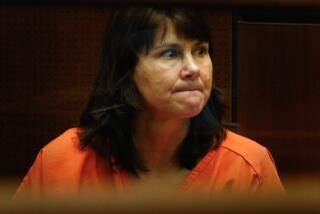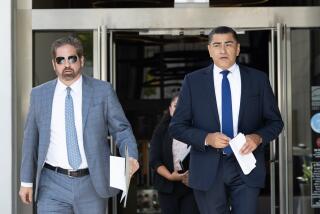Jealousy drove LAPD detective to kill woman, prosecutor says
Prosecutors in the murder trial of former LAPD Det. Stephanie Lazarus made their closing argument Monday, and Lazarus’ attorney delivered much of his, leaving jurors to mull over conflicting interpretations of testimony and evidence on which the detective’s fate hinges.
Deputy Dist. Atty. Paul Nunez led the jury steadily through what he called “the overwhelming evidence of guilt” against Lazarus, who is on trial in the 1986 beating and shooting death of Sherri Rasmussen, the wife of a man Lazarus had dated.
Nunez was followed by Lazarus’ attorney, Mark Overland, who told jurors they must disregard the prosecution’s main piece of evidence and dismissed the rest of the case against Lazarus as “fluff and filler.” The jury is expected to begin deliberations Tuesday after Overland completes his closing argument.
“Justice has waited a long time for this day,” Nunez told jurors at the start of his hourlong presentation. “Twenty-six years ago, the defendant thought she had gotten away with it, thought she had committed the perfect murder.” Rasmussen’s father, sister and husband, John Ruetten, sobbed in the gallery.
Nunez repeated one last time an idea that he and his co-prosecutor, Shannon Presby, have hammered on throughout the monthlong trial: Lazarus was motivated to kill Rasmussen by the heartache and rage she felt over Rasmussen’s marriage to Ruetten, whom Lazarus had dated after the two met while students at UCLA. Reviewing testimony from Ruetten and old acquaintances, diary entries and letters, which all spoke to the strong feelings Lazarus harbored for Ruetten, Nunez implored the panel of eight women and four men to agree that Lazarus had been driven by jealousy, “one of the deepest and darkest human emotions.”
On Feb. 24, 1986, three months after Rasmussen and Ruetten were married — Rasmussen, a 29-year-old hospital nursing director, was discovered by her husband beaten and bloodied on the floor of their Van Nuys town house. She had been shot three times in the chest at close range and beaten badly in the head and face. Wounds on her wrists and cords on the floor indicated that she had been tied up.
Detectives at the time pursued a theory that Rasmussen had surprised a pair of burglars, who had then killed her. The investigation led nowhere, and the case sat untouched for nearly two decades until LAPD detectives reopened it and re-interviewed Ruetten and Rasmussen’s father, who had urged detectives at the time of the killing to consider Lazarus a suspect. Those conversations led detectives in 2009 to one of their own. Lazarus, now 51, was a 25-year veteran of the force and her arrest shocked many in the department, who had to confront the notion of a friend and colleague concealing such a violent crime in her past.
Replaying video clips from the surprise interview detectives conducted with Lazarus on the day she was arrested in 2009, Nunez homed in on what he said was her deliberate attempts to deflect questions and mislead investigators. And he went on to review the centerpiece of his and Presby’s case: A saliva sample collected from a bite mark on Rasmussen. Nunez reminded jurors of the expert who testified that DNA tests on the saliva showed it was from Lazarus. “Ladies and gentlemen,” he concluded, “this is proof beyond a reasonable doubt.”
Overland warned the jury that it was their duty to “put the brakes on justice” and carefully review the evidence. The saliva sample, he said, “cannot be trusted because its integrity has been compromised.” Overland’s main contention during the trial has been that the saliva sample was mishandled, and perhaps tampered with, over the nearly two decades it sat in a storage freezer. The plastic tube holding the sample, he emphasized, had been found poking through the evidence envelope in which it was stored. “That’s not caused by age, that’s caused by somebody pulling that flap back,” he said.
The rest of the prosecution’s case, Overland argued, amounted to circumstantial “fluff and filler” that proved nothing of Lazarus’ guilt.
He went on to review a report written by detectives at the time of the killing in which they laid out the burglary theory and did not mention Lazarus as a possible suspect. This was the conclusion “when events were fresh in everyone’s minds,” he said. “Twenty-three years later, a new group of detectives comes along…telling you, ‘Trust us. They got it wrong. We got it right.’ Why should we trust them?”
Later, Overland tried to cast some suspicion on Ruetten, questioning why he had not become more worried when he could not reach his wife on the phone the day she was killed and why he apparently had taken the time to carefully drape some dry-cleaning he carried over a couch when he saw his wife’s body on the floor. Police cleared Ruetten of any involvement in the killing.
As she has throughout the trial, Lazarus showed little emotion during the presentations. She faces life in prison if convicted.
More to Read
Sign up for Essential California
The most important California stories and recommendations in your inbox every morning.
You may occasionally receive promotional content from the Los Angeles Times.











